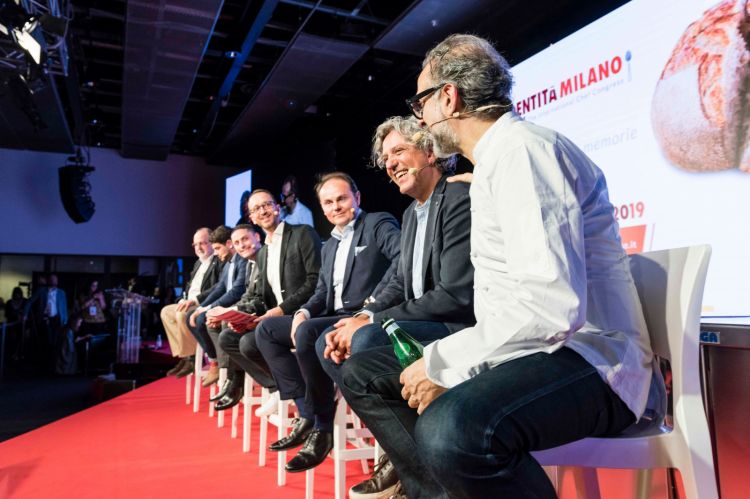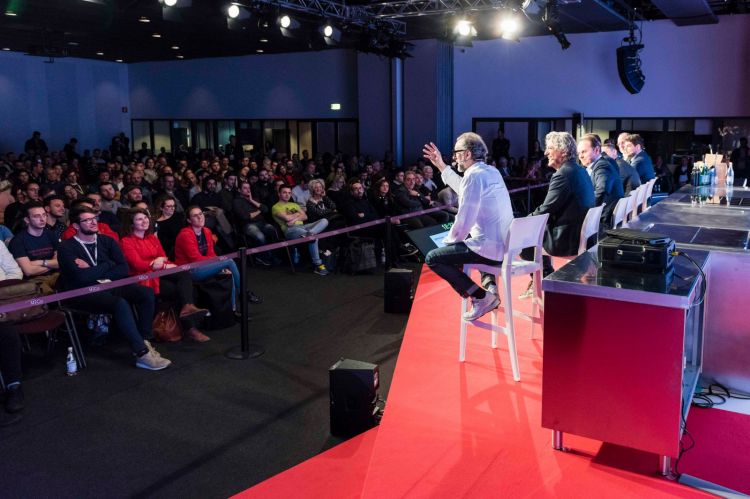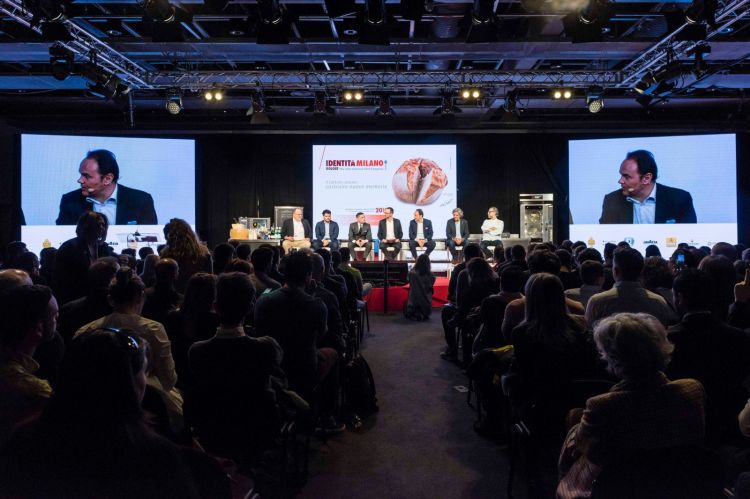Italians do it better. What? Hospitality, of course. And they do it better both in Italy and abroad. Word of master chef Giorgio Locatelli. As well as of Enrico Baronetto, Alessandro Perricone and captain Massimo Bottura, summoned by Matteo Lunelli during the round table on the “Champions of Italian hospitality in the world” promoted by Cantine Ferrari in collaboration with Identità Golose together with the Identità di sala talks that sold out at IGmi19 (Federico De CesareViola, editor in chief at Food & Wine Italia, hosted both). Indeed, this was the true surprise of the 15th edition of Identità Golose Milano, the sign that there’s a growing interest in high quality hospitality. And Italians, there’s no doubt, have all it takes to do so, and do it better.
«Dining room service can save a bad dish. But a bad service can destroy an extraordinary dish», Matteo Lunelli quoted what Massimo Bottura said from the same stage a few years ago. And if that dish is served by an Italian, it necessarily has an extra dose of energy: «Italians have one talent above all: they make people feel at ease», patron Lunellicontinues, «for us wine producers this is a gigantic asset».
And what an asset it is, if the person serving that dish is that young man in a tailor-made suit, a smile charming all of Notting Hill, noble surname and workers’ blood, with two quarters of Mediterranean human touch, who goes by the name of Enrico Baronetto. Enrico is the dining room brother of the kitchen Baronetto - Matteo, that is – and under the vaults of Alain Ducasse at The Dorchester he is the eldest in the team: «Our guys are all between 21 and 22 years old. We have a strong collaboration with catering schools, and London is surely a great opportunity for someone who wants to leave Italy and do something significant». No macho tell-tale. Baronetto Jr left for London when he was 18, and ended up right into the jaws of Gordon Ramsay. Eight years of crazy (very crazy) and desperate work in Royal Hospital Road. A short stay in Italy, freshening up his waiter uniform with Carlo Cracco and Enrico Crippa, and back to the banks of river Thames, his Eldorado, his land of payback: «People in London want human touch, and that’s what us Italians are like: we like laughing, joking with clients, a mix of casualness and British aplomb».

No chitchatting. «I remember very well when I arrived at the Savoy. There was an incredible division: in the kitchen, everyone was English and French, all the dining room staff was Italian instead. I was stunned. I was the pilgrim, the only Italian in the kitchen»: this is the black and white memory from Giorgio Locatelli who with his Italian style has settled in Seymour Street in London, where guests include people like Madonna, the Beckhams, Johnny Deep and Robbie Williams (from Take That). «Our way of being Italian, and their manner of representing us – elegant, friendly – makes our success. I’m cooking, leave me alone, that’s what the English say. We, instead, are happy to cook for someone. Service becomes crucial, as a consequence. Waiters are the cooks’ eyes and ears. In my restaurant, I have almost only Italians. And I must say I’m surprised by the standards of the guys who arrive at our restaurant». Prophets in a foreign land.
Like Alessandro Perricone, based at Relae in Copenhagen with Christian Puglisi: «He’s a friend, and a brother», and a business partner, now with 5 restaurants. He started when he was very young in Pollenzo: Perricone started studying in 2008 in Bra, at Slow Food’s university: «I already knew wine would have a main role in my life. Then I had the chance to work in the dining room with my mentor Andrea Alciati, he shed a lot of secrets and I learnt an extraordinary amount of things from him. My greatest luck». But at 20, his ambition was burning, and so was his desire to see the world. He arrived at Relae, same old continent, different world: «In the super traditional restaurant in the Langhe where I had trained, I had everything to learn. At Relae instead, the place was just born and everything had to be defined». The Danish story, written in two languages, that of Puglisi, originally from Sicily, who speaks dialect with his parents, and that of Perricone, who’s proud of his 100% Italian. The latest opening restates this concept. It’s a Vermouth bar: «We wanted to communicate the idea of aperitivo, inspired by Bud Spencer (whom I adore), foosball, some vinyls from Celentano and Raffaella Carrà».

This while Massimo Bottura exports food for the soul all around the world through his refettorios. There are volunteers queuing in towns like Paris and London, ready to offer their service in the kitchen and in the dining room, and waiting lists too [Enrico Baronetto is among those who are waiting their turn to help]. Bottura confirms: «There’s a waiting list for volunteers in London. Local restaurants send their employees to work when they’re closed». An export of humanism like at Torno Subito in Dubai, the restaurant inside the W Dubai The Palm named after the performance of an artist: «Maurizio Cattelan opened his first show in the Nineties, he closed the door of the gallery and put on a sign that said “Torno subito” [I’ll be right back]: the artwork was the people waiting for him. He instead never showed up».

A brilliant absence: «I went to Dubai to have fun, creating a circus inspired by Al Meni, as well as by Fellini’s scenes in 8 e ½, the beach in Rimini in 1965. I put the solid colours of those years and the dreams of a child on the coast of Romagna: having the white sand of the Maldives. I asked for it, they brought it to me, including paddle boats. I went for the opening, and I never went back. But I left 10 Italians, 5 in the dining room, 5 in the kitchen. What a sight. They have fun».
The audience listens carefully, and amused. Everyone surprised by the success of the debate? Until 3 years ago, it wouldn’t have been so popular. «Good ideas are not enough. You need to have them at the right moment. And in a few years’ time, we’ll need to discuss the cellar», and down the curtain goes, on this prophecy by Marchi. Let’s see what happens.
Translated by Slawka G. Scarso